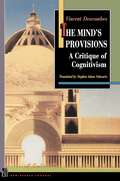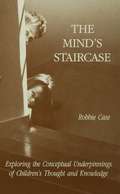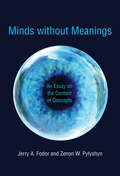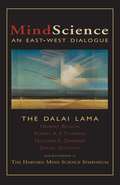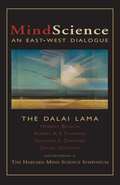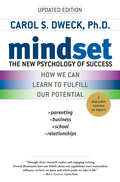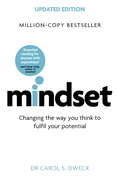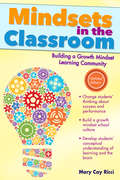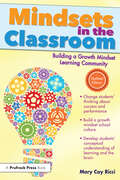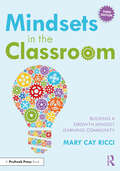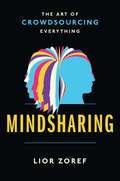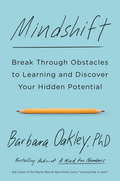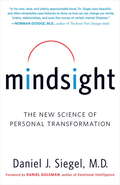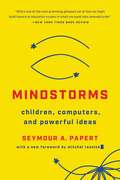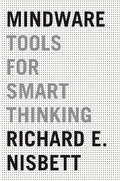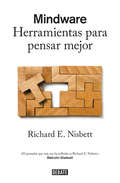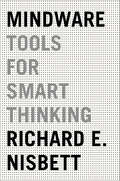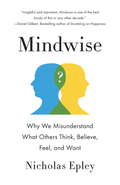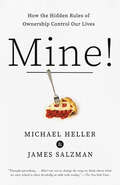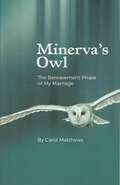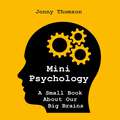- Table View
- List View
The Mind's Provisions: A Critique of Cognitivism (New French Thought Series)
by Vincent DescombesVincent Descombes brings together an astonishingly large body of philosophical and anthropological thought to present a thoroughgoing critique of contemporary cognitivism and to develop a powerful new philosophy of the mind.Beginning with a critical examination of American cognitivism and French structuralism, Descombes launches a more general critique of all philosophies that view the mind in strictly causal terms and suppose that the brain--and not the person--thinks. Providing a broad historical perspective, Descombes draws surprising links between cognitivism and earlier anthropological projects, such as Lévi-Strauss's work on the symbolic status of myths. He identifies as incoherent both the belief that mental states are detached from the world and the idea that states of mind are brain states; these assumptions beg the question of the relation between mind and brain.In place of cognitivism, Descombes offers an anthropologically based theory of mind that emphasizes the mind's collective nature. Drawing on Wittgenstein, he maintains that mental acts are properly attributed to the person, not the brain, and that states of mind, far from being detached from the world, require a historical and cultural context for their very intelligibility.Available in English for the first time, this is the most outstanding work of one of France's finest contemporary philosophers. It provides a much-needed link between the continental and Anglo-American traditions, and its impact will extend beyond philosophy to anthropology, psychology, critical theory, and French studies.
The Mind's Staircase: Exploring the Conceptual Underpinnings of Children's Thought and Knowledge
by Robbie CaseThe shortcomings of Piaget's theory of intellectual development are well-known. Less clear is what sort of theory should be devised to replace it. This volume describes the current "main contenders," including neo-Piagetian, neo-connectionist, neo-innatist and sociocultural models. Its contributors conclude that none of these models are adequate because each one implies a view of the human mind which is either too general, too particular, or too modular. A collaborative program of research -- seven years in the making -- is then described, which gives support to a newly emerging synthesis of these various positions.
Minds without Meanings: An Essay on the Content of Concepts (The\mit Press Ser.)
by Jerry A. Fodor Zenon W. PylyshynTwo prominent thinkers argue for the possibility of a theory of concepts that takes reference to be concepts' sole semantic property.In cognitive science, conceptual content is frequently understood as the “meaning” of a mental representation. This position raises largely empirical questions about what concepts are, what form they take in mental processes, and how they connect to the world they are about. In Minds without Meaning, Jerry Fodor and Zenon Pylyshyn review some of the proposals put forward to answer these questions and find that none of them is remotely defensible.Fodor and Pylyshyn determine that all of these proposals share a commitment to a two-factor theory of conceptual content, which holds that the content of a concept consists of its sense together with its reference. Fodor and Pylyshyn argue instead that there is no conclusive case against the possibility of a theory of concepts that takes reference as their sole semantic property. Such a theory, if correct, would provide for the naturalistic account of content that cognitive science lacks—and badly needs. Fodor and Pylyshyn offer a sketch of how this theory might be developed into an account of perceptual reference that is broadly compatible with empirical findings and with the view that the mental processes effecting perceptual reference are largely preconceptual, modular, and encapsulated.
MindScience
by Daniel Goleman Herbert Benson Robert Thurman His Holiness the Dalai Lama Howard GardnerWhat is the subtle relationship between mind and body? What can today's scientists learn about this relationship from masters of Buddhist thought? Is it possible that by combining Western and Eastern approaches, we can reach a new understanding of the nature of the mind, the human potential for growth, the possibilities for mental and physical health? MindScience explores these and other questions as it documents the beginning of a historic dialogue between modern science and Buddhism. The Harvard Mind Science Symposium brought together the Dalai Lama and authorities from the fields of psychiatry, psychology, neuroscience, and education. Here, they examine myriad questions concerning the nature of the mind and its relationship to the body.
MindScience: An East-West Dialogue
by Daniel Goleman Robert Thurman Dalai LamaExploration of mind/body concepts based on a Harvard Medical School symposium.
Mindset: The New Psychology of Success
by Carol S. DweckWorld-renowned Stanford University psychologist Carol Dweck, in decades of research on achievement and success, has discovered a truly groundbreaking idea--the power of our mindset.In this brilliant book, Dweck shows how success in school, work, sports, the arts, and almost every area of human endeavor can be dramatically influenced by how we approach our goals. People with a fixed mindset--those who believe that abilities are fixed--are far less likely to flourish than those with a growth mindset--those who believe that abilities can be developed through hard work, good strategies, and mentorship. Mindset reveals how great parents, teachers, managers, and athletes can put this idea to use to foster outstanding accomplishment. Praise for Mindset"A good book is one whose advice you believe. A great book is one whose advice you follow. This is a book that can change your life, as its ideas have changed mine."--Robert J. Sternberg, co-author of Teaching for Wisdom, Intelligence, Creativity, and Success "An essential read for parents, teachers [and] coaches . . . as well as for those who would like to increase their own feelings of success and fulfillment."--Library Journal (starred review) "Everyone should read this book."--Chip Heath and Dan Heath, authors of Made to Stick "One of the most influential books ever about motivation."--Po Bronson, author of NurtureShock "If you manage people or are a parent (which is a form of managing people), drop everything and read Mindset."--Guy Kawasaki, author of The Art of the Start 2.0From the Hardcover edition.
Mindset - Updated Edition: Changing The Way You think To Fulfil Your Potential
by Dr Carol DweckWorld-renowned Stanford University psychologist Carol Dweck, in decades of research on achievement and success, has discovered a truly groundbreaking idea-the power of our mindset.Dweck explains why it's not just our abilities and talent that bring us success-but whether we approach them with a fixed or growth mindset. She makes clear why praising intelligence and ability doesn't foster self-esteem and lead to accomplishment, but may actually jeopardize success. With the right mindset, we can motivate our kids and help them to raise their grades, as well as reach our own goals-personal and professional. Dweck reveals what all great parents, teachers, CEOs, and athletes already know: how a simple idea about the brain can create a love of learning and a resilience that is the basis of great accomplishment in every area.
Mindsets in the Classroom
by Mary Cay RicciWhen students believe they can that dedication and hard work can change their performance in school, they grow to become resilient, successful students. Inspired by the popular mindset idea that hard work and effort can lead to success, Mindsets in the Classroom provides educators with ideas for ways to build a growth mindset school culture, wherein students are challenged to change their thinking about their abilities and potential. The book includes a planning template, step-by-step description of a growth mindset culture, and "look-fors" for adopting a differentiated, responsive instruction model teachers can use immediately in their classrooms. It also highlights the importance of critical thinking and teaching students to learn from failure. The book includes a sample professional development plan and ideas for communicating the mindset concept to parents. With this book's easy-to-follow advice, tasks, and strategies, teachers can grow a love of learning in their students.
Mindsets in the Classroom: Building a Growth Mindset Learning Community
by Mary Cay RicciWhen students believe that dedication and hard work can change their performance in school, they grow to become resilient, successful students. Inspired by the popular mindset idea that hard work and effort can lead to success, this updated edition of Mindsets in the Classroom provides educators with ideas for ways to build a growth mindset school culture, wherein students are challenged to change their thinking about their abilities and potential. The book includes a planning template, a step-by-step description of a growth mindset culture, and Look Fors for adopting a differentiated, responsive instruction model teachers can use immediately in their classrooms. It also highlights the importance of critical thinking and teaching students to learn from failure. The four most important components of a growth mindset learning environment are also presented. The book includes a sample professional development plan and ideas for communicating the mindset concept to parents. This updated edition also presents ways to build the concept of “grit” and includes application to Makerspaces, instructional coaching, grading, and more! With this book's easy-to-follow advice, tasks, and strategies, teachers can grow a love of learning in their students.
Mindsets in the Classroom: Building a Growth Mindset Learning Community
by Mary Cay RicciThe latest edition of Mindsets in the Classroom provides educators with ideas and strategies to build a growth mindset school culture, wherein students are challenged to change their thinking about their abilities and potential through resilience, perseverance, and a variety of strategies.This updated edition contains content from the first and second edition, eliminates content that is no longer relevant, and adds a layer of learning that has occurred since the original publication: lessons learned through more recent brain research, implementation of the concept by educators across the world, as well as the author’s own observations and reflections after working in schools, coaching educators, and talking with teachers, administrators, parents, and students about their own mindsets.With this book’s easy-to-follow advice, tasks, and strategies, teachers can grow a love of learning while facilitating the development of resilient, successful students.
Mindsharing
by Lior ZorefWhether we need to make better financial choices, find the love of our life, or transform our career, crowdsourcing is the key to making quicker, wiser, more objective decisions. But few of us even come close to tapping the full potential of our online personal networks. Lior Zoref offers proven guidelines for applying what he calls "mind sharing" in new ways. For instance, he shows how a mother's Facebook update saved the life of a four-year-old boy, and how a manager used LinkedIn to create a year's worth of market research in less than a day. Zoref's clients are using his techniques to innovate and problem-solve in record time. Now he reveals how crowdsourcing has the ability to supercharge our thinking and upgrade every aspect of our lives.
Mindshift: Break Through Obstacles to Learning and Discover Your Hidden Potential
by Barbara OakleyMindshift reveals how we can overcome stereotypes and preconceived ideas about what is possible for us to learn and become. At a time when we are constantly being asked to retrain and reinvent ourselves to adapt to new technologies and changing industries, this book shows us how we can uncover and develop talents we didn’t realize we had—no matter what our age or background. We’re often told to “follow our passions.” But in Mindshift, Dr. Barbara Oakley shows us how we can broaden our passions. Drawing on the latest neuroscientific insights, Dr. Oakley shepherds us past simplistic ideas of “aptitude” and “ability,” which provide only a snapshot of who we are now—with little consideration about how we can change. Even seemingly “bad” traits, such as a poor memory, come with hidden advantages—like increased creativity. Profiling people from around the world who have overcome learning limitations of all kinds, Dr. Oakley shows us how we can turn perceived weaknesses, such as impostor syndrome and advancing age, into strengths. People may feel like they’re at a disadvantage if they pursue a new field later in life; yet those who change careers can be fertile cross-pollinators: They bring valuable insights from one discipline to another. Dr. Oakley teaches us strategies for learning that are backed by neuroscience so that we can realize the joy and benefits of a learning lifestyle. Mindshift takes us deep inside the world of how people change and grow. Our biggest stumbling blocks can be our own preconceptions, but with the right mental insights, we can tap into hidden potential and create new opportunities.From the Trade Paperback edition.
Mindsight
by Daniel J. SiegelForeword by Daniel Goleman, author of Emotional Intelligence.This groundbreaking book, from one of the global innovators in the integration of brain science with psychotherapy, offers an extraordinary guide to the practice of "mindsight," the potent skill that is the basis for both emotional and social intelligence. From anxiety to depression and feelings of shame and inadequacy, from mood swings to addictions, OCD, and traumatic memories, most of us have a mental "trap" that causes recurring conflict in our lives and relationships. Daniel J. Siegel, M.D., a clinical professor of psychiatry at the UCLA School of Medicine and co-director of the UCLA Mindful Awareness Research Center, shows us how to use mindsight to escape these traps. Through his synthesis of a broad range of scientific research with applications to everyday life, Dr. Siegel has developed novel approaches that have helped hundreds of patients free themselves from obstacles blocking their happiness. By cultivating mindsight, all of us can effect positive, lasting changes in our brains--and our lives. A book as inspiring as it is profound, Mindsight can help us master our emotions, heal our relationships, and reach our fullest potential.
Mindstorms: Children, Computers, And Powerful Ideas
by Seymour A. PapertIn this revolutionary book, a renowned computer scientist explains the importance of teaching children the basics of computing and how it can prepare them to succeed in the ever-evolving tech world.Computers have completely changed the way we teach children. We have Mindstorms to thank for that. In this book, pioneering computer scientist Seymour Papert uses the invention of LOGO, the first child-friendly programming language, to make the case for the value of teaching children with computers. Papert argues that children are more than capable of mastering computers, and that teaching computational processes like de-bugging in the classroom can change the way we learn everything else. He also shows that schools saturated with technology can actually improve socialization and interaction among students and between students and teachers.Technology changes every day, but the basic ways that computers can help us learn remain. For thousands of teachers and parents who have sought creative ways to help children learn with computers, Mindstorms is their bible.
Mindwandering: How Your Constant Mental Drift Can Improve Your Mood and Boost Your Creativity
by Moshe Bar&“One of the pre-eminent cognitive neuroscientists of his generation&” explores the proven benefits of letting your mind wander and the positive impact it can have on your mood and creative potential (Daniel Gilbert, author of Stumbling On Happiness). Our brains are noisy; certain regions are always grinding away at involuntary activities like daydreaming, worrying about the future, and self-chatter, taking up to forty-seven percent of our waking time. This is mindwandering—and while it can tug your attention away from the present and contribute to anxiety and depression, cognitive neuroscientist Moshe Bar is here to tell you about the method behind this apparent madness. Mindwandering is the first popular book to explore this multi-faceted phenomenon of your wandering mind and introduces you to the new, exciting research behind it. Bar combines his decades of research to explain the benefits and the possible cost of mindwandering within the broader context of psychology, neuroscience, psychiatry and philosophy, providing you with practical knowledge that can help you: Develop your sense of self, better relate to others, and make associations that help you understand the world around youIncrease your ability to focus by understanding when to wander—and when not toMagnify and enrich your experiences by learning about full immersionStimulate your creativity by combing through the past and making predictions about the futureBoost your mood by unleashing your mind.
Mindware
by Richard NisbettLearn how to think more effectively, at work and at home. Many scientific and philosophical ideas are so powerful that they can be applied to our lives at home and work and school to help us think smarter and more effectively about our behaviour and the world around us. Surprisingly, many of these ideas remain unknown to most of us. In Mindware, the world-renowned psychologist Richard Nisbett presents these ideas in clear and accessible detail, offering a tool kit for better thinking and wiser decisions. He has made a distinguished career of studying and teaching such powerful problem-solving concepts as the law of large numbers, statistical regression, cost-benefit analysis, sunk costs and opportunity costs, and causation and correlation, probing how best to teach others to use them effectively in their daily lives. In this groundbreaking book, he shows that a course in a given field--statistics or economics, for example--often doesn't work as well as a few minutes of more practical instruction in analyzing everyday situations. Mindware shows how to reframe common problems in such a way that these powerful scientific and statistical concepts can be applied to them. The result is an enlightening and practical guide to the most powerful tools of reasoning ever developed--tools that can easily be used to make better professional, business and personal decisions.
Mindware: Herramientas para pensar mejor
by Richard E. NisbettUn libro revelador que nos enseña a analizar problemas cotidianos aplicando las herramientas científicas más útiles para tomar mejores decisiones profesionales, empresariales y personales. Hay conceptos científicos y lógicos que cambian el modo en que solucionamos problemas cotidianos al ayudarnos a pensar de modo más claro acerca del mundo y de nuestras acciones. Sorprendentemente, pese a su utilidad, muchas de estas herramientas permanecen olvidadas por la mayoría de nosotros. En Mindware, el eminente psicólogo Richard E. Nisbett expone estos conceptos de manera clara y accesible. La distinguida carrera de Nisbett ha consistido en el estudio y la difusión de ideas tan potentes para resolver situaciones como la ley de los grandes números, regresiones estadísticas, análisis de coste y beneficio, costes de oportunidad y costes hundidos, o la causalidad y la correlación, en busca de la mejor manera de lograr que los demás los usen eficazmente en su día a día. En este libro, Nisbett nos enseña a analizar problemas habituales de manera que estos principios científicos y estadísticos sean aplicables. El resultado es una guía tan práctica como iluminadora a las herramientas de pensamiento más importantes; herramientas que se pueden emplear de modo inmediato para tomar mejores decisiones profesionales, empresariales y personales. Críticas:«El pensador que más me ha influido es el psicólogo Richard Nisbett. A él le debo mi visión del mundo.»Malcolm Gladwell «Mindware nos ofrece la oportunidad de comprender y reaccionar de modo más inteligente al caótico mundo que nos rodea.»Leonard Mlodinow, The New Yor Times Book Review
Mindware: Tools for Smart Thinking
by Richard E. NisbettAn accessible guide to essential tools of reasoning that can help you make better decisions in your daily life.Scientific and philosophical concepts can change the way we solve problems by helping us to think more effectively about our behavior and our world. Surprisingly, despite their utility, many of these tools remain unknown to most of us.In Mindware, the world-renowned psychologist Richard E. Nisbett presents these ideas in clear and accessible detail. Nisbett has made a distinguished career of studying and teaching such powerful problem-solving concepts as the law of large numbers, statistical regression, cost-benefit analysis, sunk costs and opportunity costs, and causation and correlation, probing the best methods for teaching others how to use them effectively in their daily lives. In this groundbreaking book, Nisbett shows us how to frame common problems in such a way that these scientific and statistical principles can be applied to them. The result is an enlightening and practical guide to the most essential tools of reasoning ever developed—tools that can easily be used to make better professional, business, and personal decisions.Praise for Mindware“Compelling . . . With clear explanations of relevant principles from statistics, formal logic, economics, and psychology, Nisbett does indeed assemble a powerful toolkit for examining the validity of claims made by marketers, politicians, and scientists. Just as important, he encourages us to turn these tools inward and test the legitimacy of our own easily swayed opinions and beliefs.” —The Boston Globe“[Mindware] is friendly and practical and aimed squarely at the lay reader. [Nisbett] sees his book as rather like a crash course in making better decisions and learning what scientifically proven theory to apply to which problem, enabling the reader to “perceive the world more accurately and behave more sensibly.”“—The Sunday Times (UK)
Mindwise
by Nicholas EpleyYou are a mind reader, born with an extraordinary ability to understand what others think, feel, believe, want, and know. It's a sixth sense you use every day, in every personal and professional relationship you have. At its best, this ability allows you to achieve the most important goal in almost any life: connecting, deeply and intimately and honestly, to other human beings. At its worst, it is a source of misunderstanding and unnecessary conflict, leading to damaged relationships and broken dreams. How good are you at knowing the minds of others? How well can you guess what others think of you, know who really likes you, or tell when someone is lying? How well do you really understand the minds of those closest to you, from your spouse to your kids to your best friends? Do you really know what your coworkers, employees, competitors, or clients want?In this illuminating exploration of one of the great mysteries of the human mind, University of Chicago psychologist Nicholas Epley introduces us to what scientists have learned about our ability to understand the most complicated puzzle on the planet--other people--and the surprising mistakes we so routinely make. Why are we sometimes blind to the minds of others, treating them like objects or animals? Why do we sometimes talk to our cars, or the stars, as if there is a mind that can hear us? Why do we so routinely believe that others think, feel, and want what we do when, in fact, they do not? And why do we believe we understand our spouses, family, and friends so much better than we actually do? Mindwise will not turn other people into open books, but it will give you the wisdom to revolutionize how you think about them--and yourself. From the Hardcover edition.
Mindwise
by Nicholas EpleyYou are a mind reader, born with an extraordinary ability to understand what others think, feel, believe, want, and know. It's a sixth sense you use every day, in every personal and professional relationship you have. At its best, this ability allows you to achieve the most important goal in almost any life: connecting, deeply and intimately and honestly, to other human beings. At its worst, it is a source of misunderstanding and unnecessary conflict, leading to damaged relationships and broken dreams. How good are you at knowing the minds of others? How well can you guess what others think of you, know who really likes you, or tell when someone is lying? How well do you really understand the minds of those closest to you, from your spouse to your kids to your best friends? Do you really know what your coworkers, employees, competitors, or clients want?In this illuminating exploration of one of the great mysteries of the human mind, University of Chicago psychologist Nicholas Epley introduces us to what scientists have learned about our ability to understand the most complicated puzzle on the planet--other people--and the surprising mistakes we so routinely make. Why are we sometimes blind to the minds of others, treating them like objects or animals? Why do we sometimes talk to our cars, or the stars, as if there is a mind that can hear us? Why do we so routinely believe that others think, feel, and want what we do when, in fact, they do not? And why do we believe we understand our spouses, family, and friends so much better than we actually do? Mindwise will not turn other people into open books, but it will give you the wisdom to revolutionize how you think about them--and yourself. From the Hardcover edition.
Mindwise
by Nicholas EpleyYou are a mind reader, born with an extraordinary ability to understand what others think, feel, believe, want, and know. It's a sixth sense you use every day, in every personal and professional relationship you have. At its best, this ability allows you to achieve the most important goal in almost any life: connecting, deeply and intimately and honestly, to other human beings. At its worst, it is a source of misunderstanding and unnecessary conflict, leading to damaged relationships and broken dreams. How good are you at knowing the minds of others? How well can you guess what others think of you, know who really likes you, or tell when someone is lying? How well do you really understand the minds of those closest to you, from your spouse to your kids to your best friends? Do you really know what your coworkers, employees, competitors, or clients want?In this illuminating exploration of one of the great mysteries of the human mind, University of Chicago psychologist Nicholas Epley introduces us to what scientists have learned about our ability to understand the most complicated puzzle on the planet--other people--and the surprising mistakes we so routinely make. Why are we sometimes blind to the minds of others, treating them like objects or animals? Why do we sometimes talk to our cars, or the stars, as if there is a mind that can hear us? Why do we so routinely believe that others think, feel, and want what we do when, in fact, they do not? And why do we believe we understand our spouses, family, and friends so much better than we actually do? Mindwise will not turn other people into open books, but it will give you the wisdom to revolutionize how you think about them--and yourself. From the Hardcover edition.
Mindwise
by Nicholas EpleyYou are a mind reader, born with an extraordinary ability to understand what others think, feel, believe, want, and know. It's a sixth sense you use every day, in every personal and professional relationship you have. At its best, this ability allows you to achieve the most important goal in almost any life: connecting, deeply and intimately and honestly, to other human beings. At its worst, it is a source of misunderstanding and unnecessary conflict, leading to damaged relationships and broken dreams. How good are you at knowing the minds of others? How well can you guess what others think of you, know who really likes you, or tell when someone is lying? How well do you really understand the minds of those closest to you, from your spouse to your kids to your best friends? Do you really know what your coworkers, employees, competitors, or clients want? In this illuminating exploration of one of the great mysteries of the human mind, University of Chicago psychologist Nicholas Epley introduces us to what scientists have learned about our ability to understand the most complicated puzzle on the planet--other people--and the surprising mistakes we so routinely make. Why are we sometimes blind to the minds of others, treating them like objects or animals? Why do we sometimes talk to our cars, or the stars, as if there is a mind that can hear us? Why do we so routinely believe that others think, feel, and want what we do when, in fact, they do not? And why do we believe we understand our spouses, family, and friends so much better than we actually do? Mindwise will not turn other people into open books, but it will give you the wisdom to revolutionize how you think about them--and yourself. From the Hardcover edition.
Mine!: How the Hidden Rules of Ownership Control Our Lives
by James Salzman Michael A. HellerA hidden set of rules governs who owns what--explaining everything from whether you can recline your airplane seat to why HBO lets you borrow a password illegally--and in this lively and entertaining guide, two acclaimed law professors reveal how things become "mine.""Mine" is one of the first words babies learn. By the time we grow up, the idea of ownership seems natural, whether buying a cup of coffee or a house. But who controls the space behind your airplane seat: you reclining or the squished laptop user behind? Why is plagiarism wrong, but it's okay to knock-off a recipe or a dress design? And after a snowstorm, why does a chair in the street hold your parking space in Chicago, but in New York you lose the space and the chair?Mine! explains these puzzles and many more. Surprisingly, there are just six simple stories that everyone uses to claim everything. Owners choose the story that steers us to do what they want. But we can always pick a different story. This is true not just for airplane seats, but also for battles over digital privacy, climate change, and wealth inequality. As Michael Heller and James Salzman show--in the spirited style of Freakonomics, Nudge, and Predictably Irrational--ownership is always up for grabs.With stories that are eye-opening, mind-bending, and sometimes infuriating, Mine! reveals the rules of ownership that secretly control our lives.
Minerva's Owl: The Bereavement Phase of My Marriage
by Carol Matthews"Of the numerous books that have been written about loss, Matthews has given us an original, startling and deeply thought-provoking work. . . What we are left with is a sense of peace -- the kind that comes with the knowledge that, even in the darkest places, we are not alone." -- Eve Joseph, author of In the Slender MarginMinerva's Owl is a memoir that celebrates marriage and explores bereavement a stage of married love. It includes literary references, conversations, letters and memories that are framed in six sections: grieving, longing, belonging, mourning, cleaving and, ultimately, surviving. It does not offer easy answers or a step-by-step guide to grief -- rather, Minerva's Owl provides an unforgettable account of great love and loss.
Mini Psychology: A Small Book About Our Big Brains
by Jonny Thomson'The most comprehensive - and delightful - guide to the human mind.' STEPHANIE HARRISON'This little book would persuade you that psychology is not just fun but hugely important.' PROFESSOR GEOFF BEATIEWhy do people stay in unhappy relationships?What are the six tricks for successful persuasion?Can personality traits predict future criminality?And what can pigeons tell us about superstitious behaviour?Whether you're a student of psychology or you're just interested in the workings of the brain, Mini Psychology offers a window onto the fascinating mysteries of the human psyche, covering everything from how our memories are formed to why some people are so resistant to change.Focusing on the curious stories behind the abstract theories, it explains the major ideas and names you need to know - and invites you to shine a light on your own inner life.More praise for Jonny Thomson:'Witty, knowledgeable and mind-expanding' RICHARD FISHER 'Engaging, smart and wise' DAVID MITCHELL'A fun and inspiring teaser for curious minds' JÉRÉMIE HARRIS
